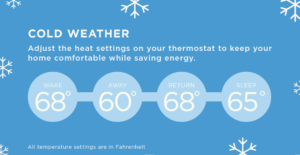How to Make Your Rental More Energy Efficient
With costs on the rise for everything, it is becoming increasingly important to find ways to save. This includes heating and cooling your rental unit in a more energy efficient manner. Talk to your landlord about any major problems like broken windows or faulty furnaces or AC units. If it is not be currently feasible to make major changes like updating to double-paned windows, there are multiple small ways you can save energy and money.

Photo by Harrison Haines from Pexels
Where Are You Losing Heat?
Roughly a third of the heat loss is through the walls. If they are poorly insulated, that can be higher. Floors and basements account for an additional 15% of heat lost. Cement is a poor insulator with an R-value of just over 1 for an 8-inch slab (the higher the R-value, the better the insulation). Because heat rises, ceilings account for 25% of the heat lost. Poor venting and cracks can increase your heat loss. Doors and windows account for an additional 25% of heat lost. You can download an infrared scanner app to your smartphone to look at where your heat loss is occurring most. Other areas of heat loss are ducts, vents, holes, and cracks.
Some tips and tricks used to deal with cold weather can be used in a slightly different way to prevent overheating in the long summer months. For instance, cooking indoors will add heat inside your home while barbequing outdoors will keep the heat outside.
Making Bigger Changes
If you own your property, you can invest in additional insulation to keep your place more energy efficient. Changing out single pane windows to double or even triple-pane can make a big difference. Installing padding and thick carpets can reduce heat loss through basement floors.
If you are renting, those may not be available options, but you may be able to talk your landlord into installing a programmable thermostat. These are relatively inexpensive and can make a big difference by automatically adjusting temperatures around your schedule. You don’t need the space as warm/cool if you are away at work during the day and the house is empty. The thermostat can be set to adjust the temperature automatically just before you get home or at bedtime if you sleep cool. It works best if you keep a fairly consistent schedule but most are also equipped with an override for occasional changes like a sick day.
Smaller Changes Anyone Can Do
Did you know most ceiling fans have summer and winter settings? By changing the spin direction of the blades, you can change the airflow directing warmer ceiling air down in the winter and improving air circulation in the summer.
Check the weather stripping and caulking around doors and windows and request repair or replacement as needed. Electrical outlets can be insulated by unscrewing the plate and filling in where insulation is sparse with foam sealant or latex caulk. You can also inspect the ductwork and plumbing for holes and crevices where heat can escape and critters can invade.
Plastic film over windows and sliding doors can cut down on heat loss when you can’t replace the windows. Heavy curtains will also help keep the heat in. Don’t forget to take advantage of the sun’s warmth by opening curtains during bright daylight hours and keeping them closed at night. Do the opposite in the summer to keep the heat of the day out and let in the cooler evening breezes at night.
If you notice issues, talk to your landlord and see if they will fix them for you. If you share walls, ceilings, or floors with neighbors, heating and cooling requirements will be slightly different than if you are in a single-family dwelling. Some of their heat loss will benefit you and vice-versa.
Non-Insulation Insulating
Hanging decorative rugs or blankets on the outside walls will not only provide a modicum of insulation but will also improve soundproofing. Throw rugs will warm hard floors. If you don’t have black-out or heavy curtains, you can try hanging blankets over the windows to keep in (or out) the heat.
Space heaters or box fans and space heaters can also be used as needed to add a little heat or cool. Make sure you don’t forget about them or they can become a fire hazard, especially if you have pets or kids that could knock them over when you aren’t looking. Be aware that some space heaters are not appropriate for rooms that are not well ventilated.
As a renter, there are many different hacks you can use to make your space more comfortable. Make sure you check with your landlord for any physical changes you want to make to the property before you make them. In Durango, The Property Manager will work with you to keep you cool in the summers and warm in the winters.
https://www.buildwithrise.com/stories/home-heat-loss
https://freeappsforme.com/infrared-camera-apps/
https://allpro-ac.com/2021/02/tricks-to-cut-down-on-heat-and-ac-loss-in-your-home/
https://www.kcrealestate.com.au/how-to-keep-your-property-cool-in-the-summer-months/



